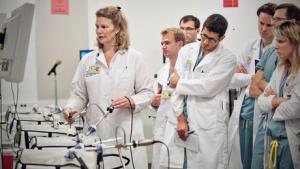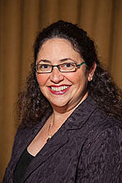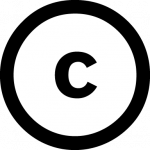
Image courtesy of the University of Michigan. CC BY NC SA.
This course provides those involved in educating members of the health professions an asynchronous, interdisciplinary, and interactive way to obtain, expand, and improve their teaching skills. These skills can then be applied within their own professional context, with a variety of learners, extending across many stages.
Course Audience
While no specific prerequisite knowledge is required, this course will be most beneficial to individuals who are actively engaged in a health professions setting such as medicine, nursing, pharmacy, dentistry, social work, and public health.
Examples include:
- Resident physicians who teach medical students and junior residents
- Nurse educators who teach nursing students and advanced nursing practitioners
- Health professions faculty members in academic centers or newly developing educational centers
- Health professions students engaged in peer-to-peer teaching and learning
- Health professionals interested in developing educational materials for their clients.
What You Will Learn
After completing this course, learners will:
1. Understand educational theory as it relates to health professions education
2. Match instructional methods with desired educational outcomes
3. Learn a variety of applied teaching techniques
4. Share successful teaching strategies
Join: Visit the course's site to register for and participate in this class.
Instructor: Caren Stalburg
Course Level: Graduate
Available on: Coursera
Syllabus
Instructional Methods in Health Professions Education
About the Course
This course provides those involved in educating members of the health professions an asynchronous, interdisciplinary, and interactive way to obtain, expand, and improve their teaching skills. These skills can then be applied within their own professional context, with a variety of learners, extending across many stages.
After completing this course, learners will:
1. Understand educational theory as it relates to health professions education
2. Match instructional methods with desired educational outcomes
3. Learn a variety of applied teaching techniques
4. Share successful teaching strategies
Suggested resources will include educational videos, individual readings, recommended
reference books, and crowd-sourced recommendations. All students should have
dependable access to the internet with video streaming capabilities. Some students
may want the ability to utilize on-line video conferencing as well.
Work Expectations
This 8 week course is comprised of podcasts, reading, and on-line discussions.
Students should anticipate a moderate workload (approximately 6-8 hours/week) that
incorporates individual reading assignments, on-line discussion, and group work. Basic
assessments of understanding take the form of on-line thought questions, reflections,
and brief multiple choice questions. Participants will also provide examples of teaching
within their own contexts, working together to solve educational challenges. While no
specific pre-requisite knowledge is required, this course will be most beneficial to
individuals who are actively engaged in a health professions setting such as medicine,
nursing, pharmacy, dentistry, social work, and public health.
Course Syllabus
The course will begin with a general discussion of adult learning theory followed by an overview of the development of intended learning outcomes and the assessment of those outcomes. This background will serve as the foundation for creating intentional educational interventions and facilitate the selection of instructional techniques. Videos and links to other educational resources will be provided within each Module. However, the following resources will be referenced throughout the course and individuals may wish to purchase their own copies of the following:
1. Curriculum Development for Medical Education: A Six-step approach. Edited by Kern DS, Thomas PA, and Hughes MT.The Johns Hopkins University Press. Baltimore. 2009. http://www.chegg.com/textbooks/curriculum-development-for-medical-educat...
2. Understanding Medical Education: Evidence, theory, and practice. Edited by Swanwick T. Association for the Study of Medical Education. Wiley-Blackwell. 2010. http://www.chegg.com/textbooks/understanding-medical-education-1st-editi...
3. A Practical Guide for Medical Teachers. Edited by Dent JA and Harden RM. Churchill Livingstone. Elsevier. 2009. http://www.chegg.com/textbooks/a-practical-guide-for-medical-teachers-3r...
Course Format
Module 1 Adult Learning Theory
- Learning styles and motivation
- Metacognition
- Social learning
- Professional identity formation
Module 2 Intended Learning Outcomes
- Bloom’s taxonomy
- Miller’s pyramid and clinical competence
- Kolb’s cycle of experiential learning
- Dreyfus model of skill acquisition
Module 3 Instructional design and individual assessment
- Multiple-choice question writing
- Skill assessment
- Oral presentations
- Rubrics and standardization
Module 4 Instructional techniques: Knowledge Transfer
- Active learning in large lecture formats
- Supportive questioning
- “Big Ticket” technique
Module 5 Instructional techniques: Skill Development
- Simulation
- Teaching with data
- Clinical reasoning
Module 6 Instructional techniques: Attitudes
- Reflection
- Feedback
- Incorporating art, music, and theater
Module 7 Instructional techniques: Teaching with technology
- Large lecture formats
- Synchronous vs. asynchronous formats
- High fidelity clinical simulations
Module 8 Application of instructional methods (capstone)
- Within learners’ specific context
- Sharing best practices with others
About the Creators

Caren Stalburg, MD
Dr. Stalburg has been associated with the U-M since 1984. She completed her undergraduate studies in 1988, graduating with High Distinction, and completed medical school in 1992. She finished residency training in 1996 and has been on faculty in the Division of Women's Health since. Dr. Stalburg is a Board-Certified Obstetrician/Gynecologist and provides general Ob/Gyn care at the West Ann Arbor Health Center. In addition to her clinical responsibilities, she is actively involved in medical education. When not at work, Dr. Stalburg is an avid football fan and enjoys music, reading, horseback riding, and travel. more...

Image courtesy of the University of Michigan. CC BY NC SA.
| Document Title | Creator | Downloads | License |
|---|---|---|---|
|
01.01 - Learning Styles and Motivation |
Caren Stalburg
|
||
|
01.01 - Philosophy of Adult Education Inventory |
WikiSpaces
|
||
|
01.02 - Metacognition |
Caren Stalburg
|
||
|
01.03 - Social Learning Theory |
Caren Stalburg
|
||
|
01.04 - Professional Identity Formation |
Caren Stalburg
|
||
|
02.01 - Bloom's Taxonomy |
Caren Stalburg
|
||
|
02.02 - Miller's Pyramid: Clinical Competence |
Caren Stalburg
|
||
|
02.03 - Dreyfus Model: Skill Acquisition |
Caren Stalburg
|
||
|
03.01 - Multiple-Choice Question Writing |
Caren Stalburg
|
||
|
03.02 - Skill Assessment |
Caren Stalburg
|
||
|
03.03 - Oral Presentation Evaluation Rubric, Formal Setting |
Caren Stalburg
|
||
|
03.03 - Oral Presentations |
Caren Stalburg
|
||
|
03.04 - Rubrics and Standardization |
Caren Stalburg
|
||
|
04.01 - Active Learning in Large Lecture Formats |
Caren Stalburg
|
||
|
04.01 Active Learning in Large Lecture Formats (Handout) |
Caren Stalburg
|
||
|
04.02 - Supportive Questioning |
Caren Stalburg
|
||
|
04.03 - "Big Ticket" Technique |
Caren Stalburg
|
||
|
05.01- Simulation |
Caren Stalburg
|
||
|
05.02 - Teaching with Data |
Caren Stalburg
|
||
|
05.03 - Clinical Reasoning |
Caren Stalburg
|
||
|
06.01 - Reflection |
Caren Stalburg
|
||
|
06.02 - Feedback |
Caren Stalburg
|
||
|
06.03 - Incorporating Art, Music, and Theater |
Caren Stalburg
|
||
|
07.01 - Large Lecture Formats |
Caren Stalburg
|
||
|
07.02 - Synchronous v. Asynchronous |
Caren Stalburg
|
||
|
07.03 - High Fidelity Clinical Simulations |
Caren Stalburg
|
||
|
08.01 - Sharing Best Practices |
Caren Stalburg
|
| Document Title | Creator | Downloads | License |
|---|---|---|---|
|
01.01 - Learning Styles and Motivation (17:46) |
Caren Stalburg
|
||
|
01.02 - Metacognition (08:28) |
Caren Stalburg
|
||
|
01.03 - Social Learning Theory (14:14) |
Caren Stalburg
|
||
|
01.04 - Professional Identity Formation (19:23) |
Caren Stalburg
|
||
|
02.01 - Bloom's Taxonomy (08:13) |
Caren Stalburg
|
||
|
02.02 - Miller's Pyramid: Clinical Competence (04:12) |
Caren Stalburg
|
||
|
02.03 - Dreyfus Model: Skill Acquisition (11:14) |
Caren Stalburg
|
||
|
03.01 - Multiple-Choice Question Writing (18:46) |
Caren Stalburg
|
||
|
03.02 - Skill Assessment (8:38) |
Caren Stalburg
|
||
|
03.03 - Oral Presentations (19:26) |
Caren Stalburg
|
||
|
03.04 - Rubrics and Standardization (13:24) |
Caren Stalburg
|
||
|
04.01 - Active Learning in Large Lecture Formats (15:31) |
Caren Stalburg
|
||
|
04.02 - Supportive Questioning (12:46) |
Caren Stalburg
|
||
|
04.03 - "Big Ticket" Technique (7:45) |
Caren Stalburg
|
||
|
05.01 - Simulation (19:48) |
Caren Stalburg
|
||
|
05.02 - Teaching with Data (21:57) |
Caren Stalburg
|
||
|
05.03 - Clinical Reasoning (14:08) |
Caren Stalburg
|
||
|
06.01 - Reflection (15:13) |
Caren Stalburg
|
||
|
06.02 - Feedback (17:42) |
Caren Stalburg
|
||
|
06.03 - Incorporating Art, Music, and Theater (12:45) |
Caren Stalburg
|
||
|
07.01 - Large Lecture Formats (15:35) |
Caren Stalburg
|
||
|
07.02 - Synchronous Vs. Asynchronous Formats (12:50) |
Caren Stalburg
|
||
|
07.03 - High Fidelity Clinical Simulations (11:47) |
Caren Stalburg
|
||
|
08.01 - Within Learners Specific Context (17:05) |
Caren Stalburg
|
| Document Title | Creator | Downloads | License |
|---|---|---|---|
|
Visit Coursera to register for and participate in this class |
Caren Stalburg
|

Image courtesy of the University of Michigan. CC BY NC SA.
Jump to:
| Document Title | Creator | Downloads | License |
|---|---|---|---|
|
01.01 - Learning Styles and Motivation |
Caren Stalburg
|
||
|
01.01 - Learning Styles and Motivation (17:46) |
Caren Stalburg
|
||
|
01.01 - Philosophy of Adult Education Inventory |
WikiSpaces
|
||
|
01.02 - Metacognition |
Caren Stalburg
|
||
|
01.02 - Metacognition (08:28) |
Caren Stalburg
|
||
|
01.03 - Social Learning Theory |
Caren Stalburg
|
||
|
01.03 - Social Learning Theory (14:14) |
Caren Stalburg
|
||
|
01.04 - Professional Identity Formation |
Caren Stalburg
|
||
|
01.04 - Professional Identity Formation (19:23) |
Caren Stalburg
|
| Document Title | Creator | Downloads | License |
|---|---|---|---|
|
02.01 - Bloom's Taxonomy |
Caren Stalburg
|
||
|
02.01 - Bloom's Taxonomy (08:13) |
Caren Stalburg
|
||
|
02.02 - Miller's Pyramid: Clinical Competence |
Caren Stalburg
|
||
|
02.02 - Miller's Pyramid: Clinical Competence (04:12) |
Caren Stalburg
|
||
|
02.03 - Dreyfus Model: Skill Acquisition |
Caren Stalburg
|
||
|
02.03 - Dreyfus Model: Skill Acquisition (11:14) |
Caren Stalburg
|
| Document Title | Creator | Downloads | License |
|---|---|---|---|
|
03.01 - Multiple-Choice Question Writing |
Caren Stalburg
|
||
|
03.01 - Multiple-Choice Question Writing (18:46) |
Caren Stalburg
|
||
|
03.02 - Skill Assessment |
Caren Stalburg
|
||
|
03.03 - Oral Presentation Evaluation Rubric, Formal Setting |
Caren Stalburg
|
||
|
03.03 - Oral Presentations |
Caren Stalburg
|
||
|
03.03 - Oral Presentations (19:26) |
Caren Stalburg
|
||
|
03.04 - Rubrics and Standardization |
Caren Stalburg
|
||
|
03.04 - Rubrics and Standardization (13:24) |
Caren Stalburg
|
| Document Title | Creator | Downloads | License |
|---|---|---|---|
|
04.01 - Active Learning in Large Lecture Formats |
Caren Stalburg
|
||
|
04.01 - Active Learning in Large Lecture Formats (15:31) |
Caren Stalburg
|
||
|
04.01 Active Learning in Large Lecture Formats (Handout) |
Caren Stalburg
|
||
|
04.02 - Supportive Questioning |
Caren Stalburg
|
||
|
04.02 - Supportive Questioning (12:46) |
Caren Stalburg
|
||
|
04.03 - "Big Ticket" Technique |
Caren Stalburg
|
||
|
04.03 - "Big Ticket" Technique (7:45) |
Caren Stalburg
|
| Document Title | Creator | Downloads | License |
|---|---|---|---|
|
05.01 - Simulation (19:48) |
Caren Stalburg
|
||
|
05.02 - Teaching with Data (21:57) |
Caren Stalburg
|
||
|
05.03 - Clinical Reasoning (14:08) |
Caren Stalburg
|
| Document Title | Creator | Downloads | License |
|---|---|---|---|
|
06.01 - Reflection (15:13) |
Caren Stalburg
|
||
|
06.02 - Feedback (17:42) |
Caren Stalburg
|
||
|
06.03 - Incorporating Art, Music, and Theater (12:45) |
Caren Stalburg
|
| Document Title | Creator | Downloads | License |
|---|---|---|---|
|
07.01 - Large Lecture Formats (15:35) |
Caren Stalburg
|
||
|
07.02 - Synchronous Vs. Asynchronous Formats (12:50) |
Caren Stalburg
|
||
|
07.03 - High Fidelity Clinical Simulations (11:47) |
Caren Stalburg
|
| Document Title | Creator | Downloads | License |
|---|---|---|---|
|
08.01 - Within Learners Specific Context (17:05) |
Caren Stalburg
|




